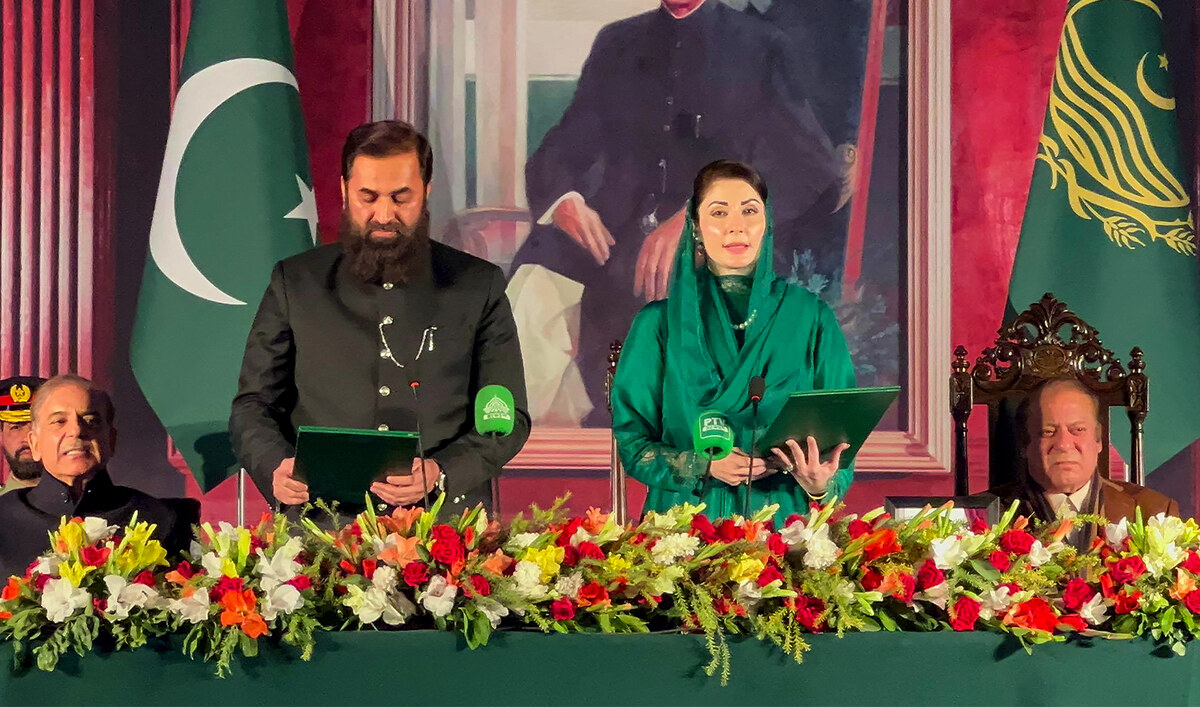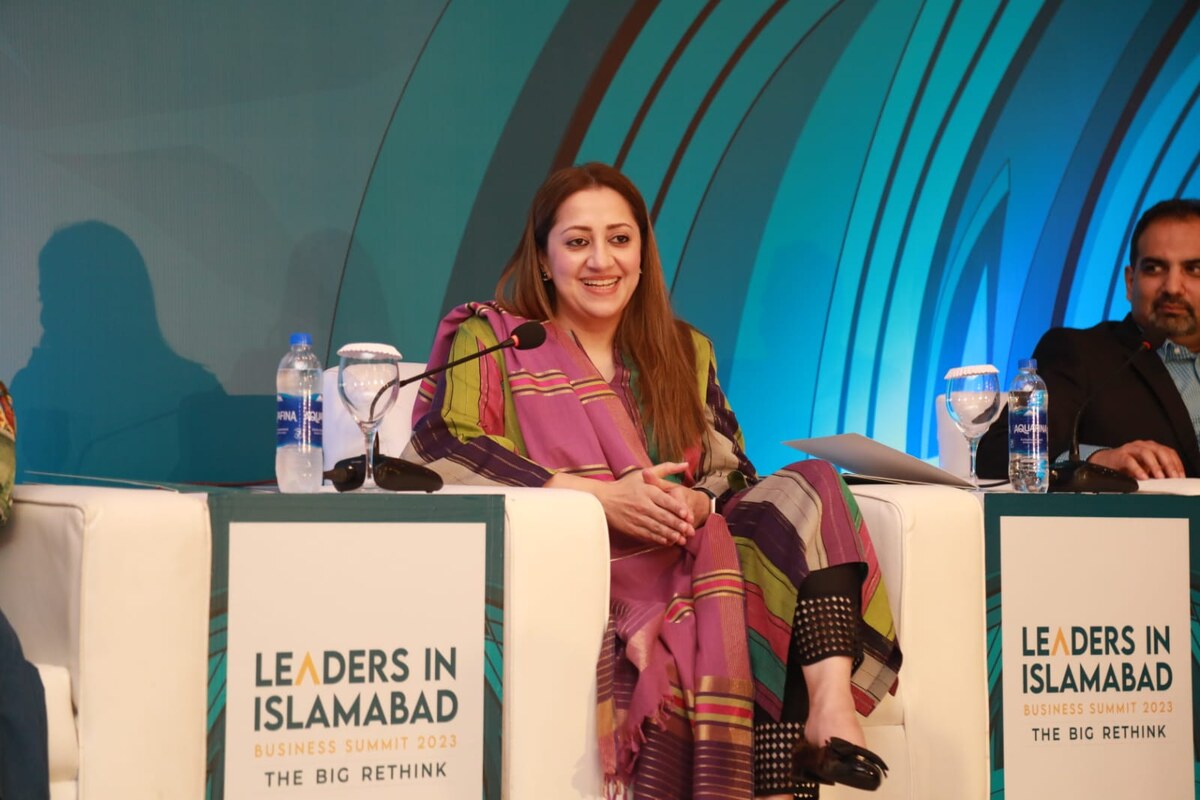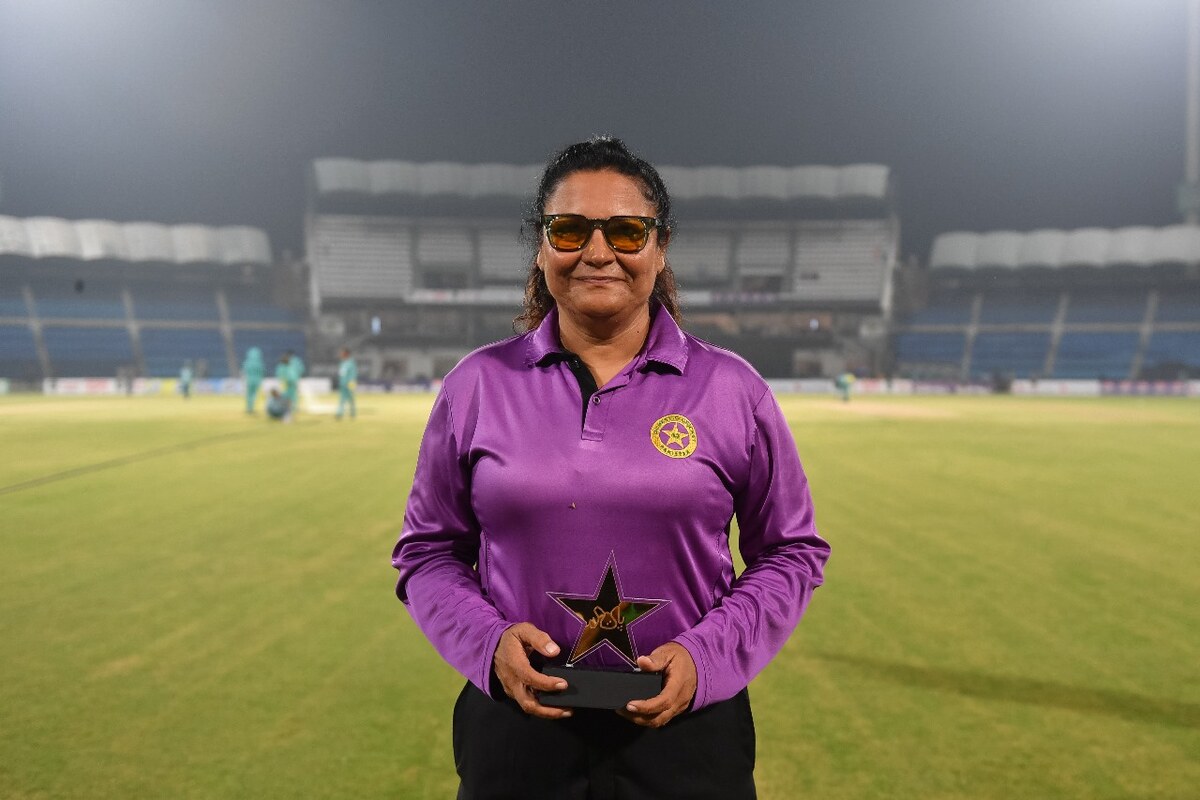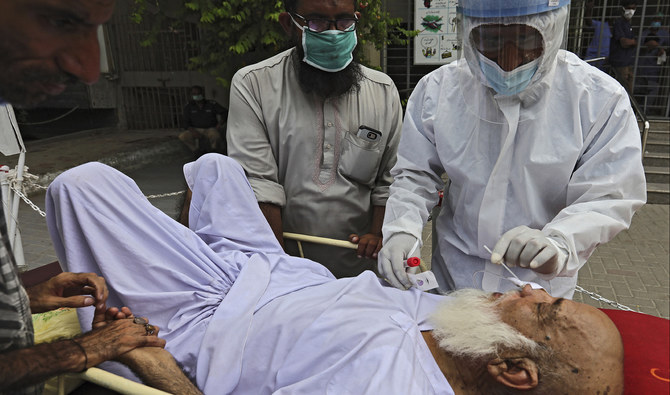ISLAMABAD: The coronavirus pandemic has amplified the critical need to speed up efforts for universal health care in Pakistan, shows a study published by Islamabad-based public policy think tank Tabadlab on Thursday.
Authored by entrepreneurial health care executive Dr. Muhammad Ali Chaudhry and public policy adviser Ammara Khan, the study points out that despite the introduction of programs and initiatives intended to improve the long-neglected state of public health in Pakistan, systemic weaknesses still prevail. The impact of these weaknesses has been perpetuated by the COVID-19 crisis, which reinforces the need to ensure effective crisis management and fast-track progress toward universal health care.
According to the paper, Pakistan ranks 154th out of 195 countries in terms of the quality and accessibility of its health care, which is far behind India (145th), China (48th), Sri Lanka (71st), Bangladesh (133rd) and Bhutan (134th).
The national health infrastructure serving the country’s 220 million population comprises 1,279 hospitals, 5,527 basic health units, 686 rural health centers, 5,671 dispensaries, 747 maternal and child health center and 441 tuberculosis centers. The total availability of beds in these health facilities is estimated at only 145,124.
Pakistan’s health care system is also severely understaffed. The paper shows that there are significantly fewer physicians, nurses, midwives, community health workers, pharmacists than the World Health Organization (WHO) recommends. Doctor to patient ratio in Pakistan 1:1,300, doctor nurse ratio is 1:2.7. The WHO suggests that doctor to patient ratio should be 1:1,000 and doctor nurse ratio 1:4. With such low levels of staffing, Pakistan is listed as one of 57 countries with a critical health workforce deficiency.
The study’s authors argue that with the current fiscal constraints on public health expenditure in Pakistan, it is necessary to explore alternative strategies for enhancing the efficiency of the health system. While the total public spending on health in Pakistan has increased in absolute terms year after year, the allocations as a percentage of GDP seem to be fluctuating significantly. Most recently, it peaked at a high of 1.2 percent in FY 2017-18 before slightly declining to 1.1 percent in 2018-19.
Since the devolution of health to the provinces, the proportion of government health spending has increased in all provinces and is accompanied by higher policy ownership for health. However, the working paper says, allocations are still inadequate to meet the country’s essential health needs and there is lack of strategic harnessing of other government and non-governmental sources of funding.
The paper notes that pressures on public health institutions from a rapidly growing population have allowed the private sector to service the gap created by an ever-increasing demand and limited public health facilities. Currently, there is a preference for private health care across the country, with 70 percent of the population paying out-of-pocket for treatment.
According to the study’s authors, the COVID-19 pandemic and its impact on the wider public health ecosystem, the economy, lives, livelihoods and wellbeing of people and communities across the country only reinforces the need for a “strong and resilient public health system, one that provides affordable high-quality health care and delivers effective crisis management.” Achieving health care universality, the researchers say, will result in improved staffing levels thereby new jobs, ancillary activities that support the sector, increased demand across value chain components and room for innovation and growth.
COVID-19 crisis shows universal health care critically needed in Pakistan — research
https://arab.news/6gm8s
COVID-19 crisis shows universal health care critically needed in Pakistan — research

- Lack of public health facilities results in 70 percent of Pakistanis paying out-of-pocket for treatment
- Pakistan ranks 154th out of 195 countries in terms of the quality and accessibility of its health care, far behind India and Bangladesh
Militants attack security post in restive northwest Pakistan, killing 2

- Militants kill police officer and civilian in attack on Dera Ismail Khan district, police say
- No group has claimed responsibility for incident but suspicion likely to fall on Pakistani Taliban
PESHAWAR, Pakistan: Militants armed with assault rifles attacked a security post in restive northwest Pakistan early Tuesday, killing a police officer and a civilian, officials said.
Another officer was also wounded in the attack at the Draban Post in Dera Ismail Khan, a district in Khyber Pakhtunkhwa province, local police official Abdullah Khan said, adding that the civilian was an employee of the Customs department.
He also said security forces returned fire and that “a group of insurgents” fled the scene.
No one claimed responsibility for the attack but suspicion was likely to fall on the Pakistani Taliban, also known as Tehrik-e-Taliban Pakistan, who often target security forces across the country, especially in the former tribal regions in the troubled northwest bordering Afghanistan.
Security forces have also stepped up intelligence-based operations against the Pakistani Taliban, emboldened since the Afghan Taliban seized power in Afghanistan in 2021. The TTP is a separate group but a close ally of the Afghan Taliban.
Pakistan to launch five-year National Economic Transformation Plan targeting sustainable growth today

- Economic transformation plan to focus on export-led growth so Pakistan escapes boom-bust economic cycle, says finmin
- Development takes place as Pakistan grapples with economic crisis that has triggered inflation, drained its foreign reserves
ISLAMABAD: Pakistan’s government is set to launch its five-year homegrown National Economic Plan today, Tuesday, targeting sustainable growth and development in the long-term, Finance Minister Muhammad Aurangzeb said amid Islamabad’s struggle to ward off its macroeconomic crisis.
Pakistan’s government has attempted to steer itself out of a prolonged macroeconomic crisis that has weakened the South Asian country’s currency and drained its foreign exchange reserves over the past two years.
Pakistan’s Planning Minister Ahsan Iqbal said in July that the National Economic Plan will be based on the 5Es framework (exports, energy, economic growth, education and equality), adding that it would aim to foster stability and lay the foundation for future growth in Pakistan.
In a video message, Aurangzeb said the plan has been aptly titled “Uraan Pakistan” which means “Flying Pakistan,” and aims to take the country’s prevalent macroeconomic stability to sustainable growth.
“There are three to four key pillars of this [economic plan],” Aurangzeb said. “First of all, our growth will be export-led so that we do not go into the boom-bust cycle that we have been going through for the past few eras. Secondly, the private sector has to lead this country,” he added.
Pakistan agreed to a 37-month, $7 billion bailout program from the International Monetary Fund (IMF) this year, promising the lender financial reforms in exchange for it. These reforms include increasing the tax base, regulating the energy sector and handing over loss-making state owned enterprises to the private sector.
“The structural reforms that we have started, we have to take them through the finishing line,” the minister said. “Whether that is on the taxation side, whether its on the energy side, whether it’s our SOE reforms, whether it’s our privatization agenda.”
Aurangzeb vowed that the plan would put Pakistan on an upward economic trajectory in the next two to three years, saying it would ensure that this will be the last IMF program Islamabad resorts to.
The development takes place amid Prime Minister Shehbaz Sharif’s increased efforts for greater collaboration in trade, defense, agriculture and other key sectors of the economy with regional allies to attract foreign investment and brighten Pakistan’s economic prospects.
In its move to attract foreign investment in key sectors, Pakistan has enhanced its bilateral trade and investment ties with Saudi Arabia, the United Arab Emirates, Russia, Central Asian states and other Gulf countries.
Pakistan suffered a sovereign default before Islamabad clinched a last-gasp $3 billion bailout program from the International Monetary Fund (IMF) in 2023 that helped its economy stay afloat. Pakistan’s Finance Minister Muhammad Aurangzeb has repeatedly said Islamabad needs to adopt an export-led economy to achieve long-term and sustainable economic growth.
Pakistan PM calls for collaborative efforts to stem polio amid alarming surge in cases

- Pakistan has so far reported 68 poliovirus cases this year, 27 of them from Balochistan
- Shehbaz Sharif says security of polio volunteers and vaccinators cannot be compromised
ISLAMABAD: Prime Minister Shehbaz Sharif has called for greater collaboration among the country’s health authorities to stem the spread of poliovirus, state-run media reported this week, as Pakistan witnesses an alarming surge in cases of the infection.
Polio is a paralyzing disease that has no cure. Multiple doses of the oral polio vaccine and completion of the routine vaccination schedule for all children under the age of five is essential to provide children high immunity against this terrible disease. Pakistan, along with neighboring Afghanistan, remains the last polio-endemic country in the world.
Pakistan on Monday reported its 68th poliovirus case of the year when a child contracted the virus from the northwestern Dera Ismail Khan district. Sharif spoke to the national anti-polio team on Monday regarding efforts to curb the spread of the disease.
“The Prime Minister said unfortunately, the number of polio-affected children is rising in Pakistan, which needs even more collaborative efforts,” the state-run Radio Pakistan reported on Monday.
Sharif noted that the use of technology in Pakistan’s health sectors, including polio eradication, is being increased to modernize public health care and achieve better results.
“He added that the security of polio workers cannot be compromised, and all possible measures should be taken in this regard,” Radio Pakistan said.
Of the 68 cases reported this year, 27 were from Balochistan, 20 from Khyber Pakhtunkhwa, 19 from Sindh, and one each from Punjab and Islamabad, according to Pakistan’s anti-polio program.
A sub-national polio vaccination campaign was conducted across Punjab, Sindh, KP, Azad Kashmir, Gilgit-Baltistan and Islamabad on December 16–22, vaccinating over 42 million children.
Pakistani bank arranges $300 million loan for government through UAE branch

- United Bank Limited operates one of largest branch networks in Pakistan
- Initiative to help shape a stronger, more vibrant Pakistani economy, says UBL
ISLAMABAD: The United Bank Limited (UBL) this week announced it had facilitated $300 million in foreign financing for Pakistan’s government through its branch in the United Arab Emirates (UAE), saying that the initiative would help shape the country’s economy into a more vibrant one as Islamabad struggles to repay its external debt obligations.
UBL is a banking company incorporated in Pakistan and one that is engaged in commercial banking and related services. It operates one of the largest branch networks in the country, augmented by its industry-leading digital banking services which have earned it local and international recognition.
“UBL UAE is proud to facilitate $300 million in foreign financing for the Government of Pakistan— a testament to our commitment toward setting new standards in the banking industry,” the bank said in a statement on its social media accounts on Monday.
“This venture marks another milestone in our journey to shape a stronger, more vibrant economy.”
Pakistan has struggled to meet its external debt repayment obligations, often resulting in its regional allies rolling over loans worth billions of dollars. The cash-strapped nation has been struggling to ward off an economic crisis that has drained its revenue, pushed inflation to record levels, and weakened its currency significantly over the past two years.
Pakistan secured a fresh 37-month $7 billion loan from the International Monetary Fund (IMF) this year after it narrowly avoided a sovereign default on its payment obligations in 2023. Pakistan’s finance minister, however, has reiterated the country needs to move toward an export-oriented growth model supplemented by long-term financial reforms to ensure its progress is sustainable.
Top five Pakistani women who led the way as trailblazers in 2024

- Pakistan’s Ayla Majid became first Muslim and South Asian to get elected president of global accountancy body ACCA
- Maryam Nawaz became the first woman chief minister of a Pakistani province after contentious elections in February
ISLAMABAD: As the world prepares to bid farewell to an eventful 2024 and welcome the new year, here is a list of five Pakistani women who shattered stereotypes and made history by dominating in their respective fields ranging from politics to mountaineering, and sports to music.
Maryam Nawaz Sharif
Maryam Nawaz Sharif, the daughter of three-time former prime minister Nawaz Sharif, made history in February after she was elected as the first woman chief minister of a Pakistani province.

After her Pakistan Muslim League-Nawaz (PML-N) party won the highest number of seats after a contentious election in February, Sharif was elected as the chief minister of the country’s richest and most populous Punjab province.
She formally joined politics in 2012 and became increasingly involved in politics during her father’s four-year, self-imposed exile in the United Kingdom from 2019 to 2023. In 2019, she was appointed vice president of the PML-N, leading anti-government rallies throughout the country against then prime minister Imran Khan’s government.
Political opponents and critics, however, say her election to the chief minister’s post is an example of the enduring influence of feudal politics in Pakistan.
Ayla Majid
In November, Ayla Majid became the first South Asian and Muslim to be elected president of the Association of Chartered Certified Accountants (ACCA), a global accountancy body.
Majid is the chief executive officer of a firm that advises on decarbonization, sustainability, and energy transition. Majid is leading more than 252,500 members and 526,000 future members of ACCA across 180 countries during her year-long term in office.

She has over 20 years of experience in energy, transaction advisory, mergers and acquisitions, investments and corporate governance. Majid holds a Master of Business Administration degree from the Lahore University of Management Sciences (LUMS) and a Bachelor of Law degree from the University of London.
Arooj Aftab
Pakistani singer Arooj Aftab earned Grammy nominations for the fourth time in a row in November. Her single “Raat Ki Rani” earned a nomination in the Best Global Music Performance, category while her album, “Night Reign” has earned a nomination for the Best Alternative Jazz Album category.

This category honors vocal or instrumental albums where new alternative jazz recordings comprise more than 75 percent of the playing time.
In 2022, Aftab became the first Pakistani singer to win a Grammy for her song ‘Mohabbat’ in the Best Global Music Performance category.
Naila Kiani
In May, Dubai-based mountaineer Naila Kiani became the first Pakistani woman to summit Mount Makalu, the fifth-highest mountain in the world. The tremendous achievement also brought another feather to Kiani’s cap, as it made her the first and only Pakistani woman to summit 11 out of 14 mountains that stand 8,000 meters above sea level.

Kiani had previously summited Broad Peak (8,047 meters), Annapurna (8,091 meters), K2 (8,611 meters), Lhotse (8,516 meters), Gasherbrum 1 (8,068 meters), Gasherbrum II (8,035 meters), Nanga Parbat (8,125 meters), Mount Everest (8,849 meters), Manaslu (8,156 meters) and Cho Oyu (8,201 meters) mountains.
The mother of two, who is also a banker by profession, garnered fame in 2018 after her wedding photos from K2’s base camp were widely shared on social media. She is also a recipient of the Sitara-e-Imtiaz, Pakistan’s third-highest civilian award, which she received in March 2024 for climbing Mount Everest.
Saleema Imtiaz
Saleema Imtiaz became the first Pakistani woman to be nominated to the International Cricket Council’s International Panel of Development Umpires in September. The nomination qualifies Imtiaz, 52, to officiate in women’s bilateral international matches and ICC Women’s Events.

Imtiaz, mother of Pakistan women’s international player Kainat Imtiaz, began her umpiring career with the Pakistan Cricket Board Women’s Umpires Panel in 2008. Her extensive experience includes officiating in high-profile events under the Asian Cricket Council such as the 2022 and 2024 ACC Women’s T20 Asia Cup and the 2023 ACC Emerging Women’s Cup in Hong Kong.










